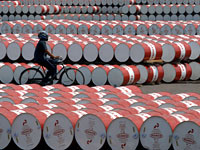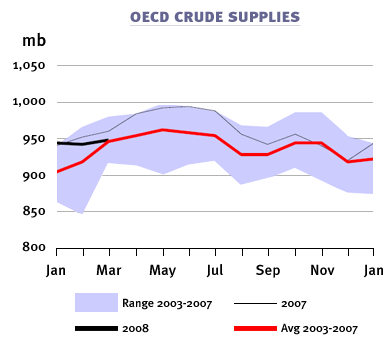Barrel FeverDoes anyone know how much oil there is in the world?
Posted Wednesday, June 25, 2008, at 6:54 AM ET

What is the "right" price for a barrel of oil? Japan's oil minister said, based on fundamentals, the price of crude should be $60 a barrel, not the $130 to $140 we see today. During congressional testimony, five oil-industry CEOs each gave estimates of where oil "ought" to be, with results ranging from $35 to $65 a barrel to $90. Even the implacable Saudis are reportedly about to increase production by half a million barrels a day, a sign that they are concerned that the current price is too high. Yet BP's chief recently said current price levels are warranted, and the oil bulls at Goldman forecast a "super spike" to $150 to $200 a barrel.
How can presumed experts be so divided? Because the data on oil stink.
Think of the host of financial and economic statistics you see every day: stock prices, unemployment data, company results, foreign exchange prices, GDP growth rates. Market information is precise. Government statistics, while a little fuzzier, are complied and computed in a generally consistent fashion.
But oil is in a completely different category: It's a strategic resource bought and sold internationally. Many countries, either by indifference or design, simply don't provide reliable information.
Price is a result of demand and supply; the Wall Street Journal recently explained why it's difficult to get a handle on demand (subscription required). The supply side is just as tricky.
The International Energy Agency, a premiere source of oil-related information, was caught off guard by the surge in oil prices, so it decided it needed to get a better grip on capacity. The IEA is only partway through a survey of the world's biggest oil fields, yet says it expects to show a significant reduction in estimated reserves.
But even when concluded, this project will be far from reliable. For starters, take OPEC, which is estimated to control two-thirds of the oil reserves and to provide 36 percent of oil production and is largely unresponsive with IEA inquiries. And cooperation doesn't always translate into insight. For instance, Iraq recently claimed it has as much as 350 billion barrels of oil, triple its proven reserves and more than even oil kingpin Saudi Arabia has. Is this claim completely crazy? No one knows for sure; Iraq is underexplored, with only 2,000 oil wells versus more than 1 million in Texas.
Here's how arcane the oil guessing game can get. Saudi's Ghawar oil field is the world's largest; it's been pumping out oil since 1951 and holds 7 percent of the world's proven reserves. Overall Saudi production has been falling since 2005, yet the number of rigs in use has tripled since 2004. Why is that? Some analysts believe the increased rigs are intended to compensate for declining production from Gwahar. Others argue that the Saudis are operating strategically, shutting their most productive wells as prices rose and opening smaller wells to better manage supply.
Experts have tried to come up with more independent and definitive answers. The Saudis use water injection to increase oil recovery. Some analyses of the water content from the northern part of Ghawar conclude that the water content has risen from 20 percent in the 1940s to 50 percent now, supposedly a sign that yields are about to fall dramatically.
Seeking to resolve this debate, investment research firm Sanford Bernstein performed a satellite analysis of the oil field, reviewing high-resolution images dating back to 2001. The water-injection methods used by the Saudis produce surface depressions when oil reservoirs become depleted. Bernstein found no signs of surface collapse. Instead, it found some areas slightly elevated, which might indicate use of high-pressure recovery, an advanced extraction technique. They concluded that only one of the oldest sections was in decline. That report was dismissed as "junk science" by industry analyst and peak-oil theorist Matthew Simmonds.
Indeed, some old oil hands argue that the entire method for computing reserves is fundamentally flawed. Richard Pike, president of the Royal Society of Chemistry, who spent 25 years in the petrochemical industry, contends in an article in the Petroleum Review that published estimates are less than 50 percent of their actual level. As the Independent summarized his argument:
Companies add the estimated capacity of oil fields in a simple arithmetic manner to get proven oil reserves. … However, mathematically it is more accurate to add the proven oil capacity of individual fields in a probabilistic manner based on the bell-shaped statistical curve used to estimate the proven, probable and possible reserves of each field. This way, the final capacity is typically more than twice that of simple, arithmetic addition.
Pike is no oil-industry shill and contends that producers understand this issue but prefer show lower totals, to help support high oil prices.
Economists think they can cut the Gordian knot of the oil supply/demand debate. Paul Krugman (along with others) has argued that if the spot-market price exceeds the level at which production meets end-user demand, inventories will rise—a far easier measurement to track than trying to estimate world demand and supply.
Yet 2008 oil supplies remain within recent historical ranges, which would mean that current prices reflect fundamental forces.
Ah, but there's a flaw in the analysis, as floor trader and columnist Daniel Dicker noted:
[O]il storage has been historically inelastic, no matter the price. … [O]ver the last 4 years (and for most of my trading life) forward [supplies] have always hovered between 50 and 55 days—storage is expensive and limited, and just not efficacious.
This is why … supply arguments are often overblown … supplies remain closely aligned to demand and rarely overrun—as OPEC members have time and again explained but are ignored.
In other words, if prices are excessive, oil gets inventoried, all right, but in the ground. Which explains the keen interest in finding out how much is really there. Just don't hold your breath waiting for a precise answer.

No comments:
Post a Comment